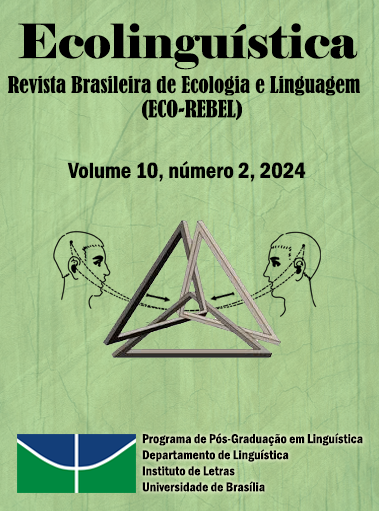Entre o humano e o animal: os discursos presentes em Os gatos te esperam, de Anderson Rodrigues
Keywords:
Análise do Discurso Ecossistêmica; Humanidade; Animalidade.Abstract
O objetivo geral deste trabalho é investigar os discursos presentes no conto Os gatos te esperam, de Anderson Rodrigues. O conto aborda a lenda urbana segundo a qual alunos que não conseguem se formar na UnB se transformam em gatos e passam a viver na instituição. Como objetivo específico, tem-se a análise da dicotomia entre humano x animal na narrativa e as visões de mundo que decorrem dessa contraposição. O trabalho é embasado na Análise do Discurso Ecossistêmica e, para se abordar a questão da humanidade e animalidade, recorre-se também ao Ecofeminismo em sua vertente animalista. Tal temática justifica-se pelo fato dos trabalhos que falam sobre formas de vida não humanas na ADE ainda serem escassos. Na análise, foca-se nas interações ficcionais que acontecem na narrativa, observando de que modo os discursos emergem a partir delas. Evidencia-se, de modo geral, que normalmente o ser humano não é visto como mais uma espécie animal, mas sim como antagônica aos animais, contrariando os princípios da ADE, que propõem o ecocentrismo em detrimento do antropocentrismo.
Downloads
Downloads
Published
How to Cite
Issue
Section
License
Copyright (c) 2024 Ecolinguística: Revista brasileira de ecologia e linguagem (ECO-REBEL)

This work is licensed under a Creative Commons Attribution-NonCommercial-NoDerivatives 4.0 International License.
Authors who publish in this journal agree to the following terms:
Authors retain copyright and grant the journal the right of first publication. The work is simultaneously licensed under the Creative Commons Attribution License allowing the sharing of the work with acknowledgment of the authorship of the work and initial publication in this journal.
Authors are authorized to enter into additional contracts separately for non-exclusive distribution of the version of the work published in this journal (e.g., publishing in institutional repositories or as book chapters), with acknowledgment of authorship and initial publication in this journal.
Authors are allowed and encouraged to post and distribute their work online (e.g., in institutional repositories or on their personal page) at any point before or during the editorial process, as this can bring about productive revisions as well as increase impact.
Citation of published works (See The Effect of Free Access).



3.png)



